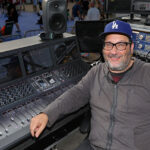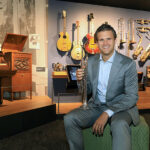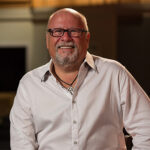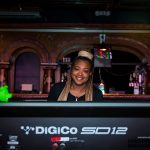Balance is a tough thing. At FOH we are constantly being bombarded with requests/ideas/suggestions for sound guys to interview. Lots of good guys out there and who gets in is as much an issue of timing as anything else. But sometimes we will have to choose between a couple of interesting candidates. Like this month. On the one hand, we've got a young guy by the name of Kyle Chirnside who has gone with Fall Out Boy from clubs to arenas in a year. On the other, Brian Ruggles–who has been at the desk with Billy Joel for 35 years and who is one of the really great live engineers still working–was going to be in town. What to do? How about both? Call it a generational thing or a passing of the torch or just a cop-out on our part but we decided to talk to both of them. And, age and experience notwithstanding, they both had some interesting thoughts on the current state of live event audio. Kyle Chirnside
On The Fast Track With Fall Out Boy
By Paul H. Overson
KYLE CHIRNSIDE: I started with Fall Out Boy about 2 years ago as their FOH engineer, we were basically doing smaller club shows at the time, pretty much couldn't fill a 500- seater. The first bus tour with them I was on was pretty much a club tour then all of a sudden it started to blow up really quickly. We started doing MTV, some late night shows and after that we did Vans Warped Tour, and we could really recognize the difference then with the crowd response–it was huge. Then we went into the Nintendo Fusion Tour, which were little bit bigger theatres, some arenas. I picked up the production managing duties, basically making sure everything was ready at the club before we got in. The tour manager took care of the other business. Pretty much when I started though it was 4 guys: the tour manager, who was also guitar tech; Dan Suh, he's still the tour manager; drum tech Eric, and me. So we started out pretty light and now we're up to like 35 crew.
Tell me about your first gear that you used when you were doing clubs.
I worked at a club in St. Louis. I kind of snuck into this place called the Animal House, they later changed the name to Club 367, and worked there for about a year. I was the house guy there while I went to school at Webster University for audio production. That didn't really work out so I started working for a production company in St. Louis called Smoke and Mirrors Productions. Basically, Smoke and Mirrors was a Martin Light company that had bought this PA from SLS. It was pretty cool to work on. Instead of compression drivers it had six-inch Mylar ribbon drivers and it was only 24 boxes total. I learned to mix on that a lot and toured with a disco cover band called Dr. Zhivegas for a long time. That got me into 36 inputs a night, full disco cover band,
What desk were you using at that time?
Just a rental, whichever one they had for me at the time.
Were you still using the SLS stuff?
We were using the SLS stuff for that, and I really grew to love the Mylar ribbon drivers. They were amazing, they were so smooth. I try to mix so it sounds like a ribbon driver now. I'm not too much on the harshness of a compression driver. I started touring with a hard-core band from St. Louis called Not Waving But Drowning. They were on the Solid State tour, which is a Christian label out of Seattle. The headliner was Zao, which is a really big Christian hard-core band. And I started doing sound for them and working with a bunch of the hard-core kids. I recorded the Not Waving But Drowning album and got credits for that. During this time I was training this kid named Super Dave, now the engineer for My Chemical Romance. He got a job with this band called the Phunk Junkeez out of Arizona and started touring and then another gig with the band called the Ridlin Kids and Lucky Boys Confusion. So he went and did that and I took over for him with the Phunk Junkeez. I did a bunch of big tours with them then hooked up with a band called the Kottonmouth Kings in Southern California and did their monitors for awhile on a couple of big tours with Insane Clown Posse. After a couple more gigs Super Dave, who was doing All American Rejects at the time, called me and told me about this band called Fall Out Boy and was like "Hey, do you need a gig?"
When you hear the band, what are you trying to bring up? Are you trying to make everything so the vocals sit high in the mix?
If you haven't seen the show–they're pretty crazy. They do jumps and spins and guitar chops and it ends up bending their strings and making them sound out of tune, or out of intonation, so it's really a constant battle. The drummer's an old death metal drummer. So he feathers the drums when he's playing really fast. He doesn't really hit super hard so it's a big tug of war with these guys.
I asked Howard Page of Showco, "What advice did you give Kyle?" And he said, all he could do was just kind of tell him to do the best that he could to kind of spread out the sound and make a place for everything.
One thing I remember is that he told me was to visually listen. Like look at the stage and see how hard he's hitting the snare. Make sure that if it looks like he's hitting it hard, it sounds like he's hitting it hard. Make sure that each instrument is present when they're being used. So, you know, I work a lot on separation and panning and stuff. They're pretty much a straightforward punk rock band and so kind of what you get is what you get. That crappy sound is kind of their token, you know when we do late night shows everybody's like "This is what they sound like?" I tell them "Yeah," and then I kind of give them a hint on how to mix them. Some of the late night shows have gotten kind of cocky with me and wanted do their own thing, but by the time camera blocking comes around the band starts jumping around and hitting things with their instruments . . . they ask me for help.
What mics are you using on the kick?
SM91 and an Audix D6. For the snare I have a D1 on top and a 57 on the bottom, AT3000s on the rack and floor. There's only three mics on the cymbals, one stage right, ride and stage left, so I mounted little micro D's underneath my cymbal stands. This helps because the bass player and guitar player are notorious for knocking down overheads or hitting the cymbal with the butt of their guitar or whatever, so it's chaos. This way it looks way clean, plus I don't get a ton of the other drums in the mix, because the mics are facing towards the cymbal underneath, so I'm not getting other things that would cause like a phasing problem or anything like that. For these guys it's awesome, you know, big ugly crashes, you know, it's hard to make sound like this.
What is the bass rig and how do you mic it?
It's a Classic head and two 810 cabinets. I use a DI from a SansAmp at Front of House. There's a 421 on the amp on-stage, but I kill that mic to the mix, so basically just my tech listens to it so he can hear if the cabinet goes out or anything. I try to keep it simple, one DI.
How about the guitars?
Two guitars. The singer plays guitar and sings and there's a guitar player stage right. For this tour I've been using 409 and a 57 on both of them. I did put Red Boxes in for monitor world and I've used them occasionally for FOH and I seem to get a pretty fat tone, like guitars are the majority of my mix pretty much.
What cabinets are they running?
Mesa 412s. There's four cabinets up there, but only one's on. Kind of keeps the stage volume low. My singer just went to PMs, too, so it kind of keeps my vocals a little cleaner now.
Keeps him on pitch?
Yeah. He's the weirdest singer ever. He never wants to hear his vocals. Ever. He just goes by pitch memory, or muscle memory basically. Sometimes he holds his guitar up to his neck so he can feel the pitch of the guitar, it's weird. He's an amazing singer too. The strongest point is Patrick's vocals– they're amazing.
And what vocal mic do you use on him?
OM7s. Audix OM7s all across the front.
If you had another Super Dave come up to you today what would you tell him?
Pay your dues. That kid actually paid his dues. He did band tours; he worked in a club really hard. He did try to go to school for awhile, but I think being at the club or in a production company is the best way to get the experience you need, touring with a band in crappy clubs where you have to go in and fix the PA every day. You gotta know how to do that.
Brian Ruggles
Supporting the Piano Man Since 1970
By Bill Evans
We knew that Brian Ruggles would be up for this generational thing when we had to wait for a while before the interview could start. He was mentoring a younger sound guy in the fine points of ambience.
BRIAN RUGGLES: He–Matt Herr–used to be my assistant for many years. He's mixing Elton John at the Coliseum–Clive Franks who normally mixes Elton had an operation, so he's just filling in. But he's young and he's still new at it, so I'm trying to help him out. I went to the show last night. I heard some things and I said, "Let me help him out a little bit with a couple of things."
I did a Faith Hill show in there once, and a Stevie Nicks, and it sounded pretty good. But it's a bitch of a room. It's so dead. So I was trying to get him to 'ambience' it up a little bit, because it has no ambience at all. It's got nothing. So don't be afraid to add some more reverb to certain things. The key– which comes with experience–is knowing when enough is enough.
I haven't seen a Show Console in two years. Is this your choice?
I like the console, the way it sounds. I don't know. It's funny about consoles these days. I don't know what I really like. I know something I don't like. I like the automation part and everything's built in as far as gates and…It's just got that digital look to it, but that analog sound, so I like that part. They like to say a PM1D is completely digital, but I don't think it sounds good. Then if you go with an XL4 or a PM5K or a 4K, I need two of them. Then I need racks and I need to take a bigger footprint. So I try and weigh it all out. This works fine. It works every day. It works fine.
I saw you walking the arena earlier. How much has the wireless Clair I/O changed the way you work?
It's great. It's fabulous. It makes it so much easier. You can go up into the nosebleeds and hear exactly what they're going to be hearing. It's a week and forever to change the level of all the different speakers, and to EQ them, and add a little more high end to the top speakers, so the guys can get that cymbal in to the back. It works great, just to walk around with it.
I always walk the arena, because we normally play 360 and I'll walk the whole arena all the way from the top to the bottom. Just walk around to make sure that everything can be heard right.
Is there anything new, different, interesting on this tour that you've been doing lately.
Not really. I went back to a Shure SM58 microphone. I took a couple of steps backwards as far as microphones.
Before I was using 8Ps, the 42-4s and the 5400s, I believe. So I just decided, let's go back to old school. Let's use the 58s again because they always sound good. They're good and solid. I tried it at rehearsals and I said, "You know, why not?"
What's the biggest change you've seen in the 36 years?
I think the line array system is the biggest thing, because it sounds so great. You don't have this huge monstrosity of a P.A. on tours anymore. It's a nice looking system. It sounds great. You can aim the sound, too.
When you see new guys coming up, what's the biggest mistake young guys make?
I don't know. I don't really go to many shows, so I don't know.
What's the most dangerous piece of gear out there for a guy who doesn't know what the hell he's doing?
A P.A. system. You can get yourself in deep doo-doo with a big P.A. If the engineer knows what he's doing, it should be fine. But if he doesn't know what he's doing, he's going to dig himself a deep hole and he's gonna be in deep shit.
But, I don't know. Tough question. I haven't seen many shows lately. I think it breaks down to experience, too. Years. Matt is doing Elton John right now. He's good. He's got the meat and potatoes together. But there's a little finessing, a little tweak here and there that make a difference.
What was the last thing you learned from another engineer?
I'm always learning something. I mean, I always learn from a lot of engineers I work with. I peek over their shoulder, or ask them "How are you getting that sound on my bass guitar? Why are you doing that?" I don't know what exactly the last thing was, but I'm always picking somebody's brain and asking them a bunch of questions. Maybe the last person was Clive. Clive Franks, when we did the Billy and Elton tour. We'd always look over each other's shoulder. "How'd you get that kick thump so good, so tight? How'd you get that bass guitar so tight?" So he might have been the last one who really helped me out with a couple of things. I don't know exactly. Like I said, we're always picking up something.
Do you think of the longevity as being open to new things?
Oh absolutely. You always have to stay open. Every day I'm learning something. Absolutely. You've got to keep an open mind about everything. It's not exact. There are certain parts of it that are exact, but there are a lot of parts of it that go different directions.
It's half art, half science. You can't change laws of physics, but you can do a lot of stuff around the laws.



